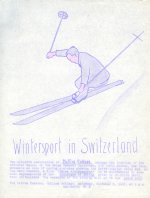
A man's life is shaped by decisions often not his own. Even before my conception it was decided what I was to be, and the date of my birth, too, was decisive.
All my paternal forebears were farmers except my father's uncle Fritz, Sir Uncle as we called him. He was a businessman, a bachelor, a dandy, and probably quite an autocrat. In 1871, when my penniless grandfather, Nicolas, having gone to look for better days in the Argentine, sent for his family, Uncle Fritz asked my grandmother to leave him two of her boys to take into his business. None but my father wanted to stay. Thus Uncle Fritz was all the family Papa had in Switzerland. In the 1890s it was still proper to marry only with the consent of one's family. So my father told his uncle, "I want to marry Lina," and got the reply, "She is a fine girl; if she wants to have you, by all means marry her, and if it's boys they will be mechanical engineers My younger brother and I never knew otherwise. We had our job assigned before birth.
I was born January 1, 1894. Had I arrived twenty hours earlier, my whole life would have been different. A young Swiss has his basic army training at twenty. I had mine in the spring of 1914 and marched to the frontier in August as an infantry private. The Swiss army recruits its subaltern officers from the upper middle class which can afford the year it takes to become a lieutenant, or from school teachers who have long vacations and can get furloughs. Had I been born December 31, 1893, I'd have gone to the frontier as an officer, not carrying the private's heavy equipment. I'd have slept in beds instead of on straw, and I'd have missed the opportunity of seeing things from the ranks.
In 1914 our army was deplorably Prussianized, and as an officer and so-called gentleman I might not have been jolted out of my bourgeois complacency and out of the career devised by Uncle Fritz. In 1918 I did become an officer and a company commander in the Motor Transportation Corps, but by that time the four war years had made me wonder about the world and my place in it. I did study mechanical engineering, but at twenty-four changed over to philosophy. I made my doctorate in 1922 and in 1923 I found my first teaching assignment six thousand miles from home, in Oregon. Like all my later jobs I found it by a string of coincidences.
Uncle Fritz died in his fifties, 1902. Papa inherited the business which prospered till 1914. When I decided to quit engineering I was in the midst of preparing for a degree examination and I gave my brother who went home for Easter the unpleasant task of facing father with my decision. The war had hurt the business badly but did not ruin it. However the firm had no need of any academically trained engineers. Papa could afford the then small expense of another few years of study for my doctorate, and he told my brother, "if Fritz thinks philosophy is his calling, so be it." I did not know that Hans, too, wanted to give up engineering. Hearing Papa's favorable decision for me, Hans said "if Fritz does not have to finish neither will I!" At that Papa exploded, "What is the matter with you boys? What do you want to do?" Hans had his plan ready. He wanted to study the agricultural tractor business in America, from manufacturing to sales, and also find an American tractor fit for Swiss hill work. Papa said that was not a bad idea, and Hans spent the years 1919 and 1920 in the Middle West and brought home the Swiss agency for the Cletrac caterpillar tractor made in Cleveland. Hans started in Wisconsin. At La Crosse Mama had an old girl friend whom we had appointed our honorary Aunt Mary. Before coming home for Christmas 1920 Hans took a trip to the West Coast, and Aunt Mary sent him to a former Swiss schoolmate of hers settled in Portland, Arnold Keller had gone from Switzerland to Oregon some thirty years before and was working as a travelling salesman, making ends meet and laying aside a little money for a visit to the old country. When he came to Switzerland in 1921, Mama invited him as a house guest. During his fortnight with us I showed him around Berne and went swimming with him in the swift river Aare. Arnold was very tall and fat and could swim only on his back. When he came floating down the river the boys exclaimed, "Look at the balloon that dropped in the river!" Arnold knew that I was at work on my dissertation, and he said I should come to the States when I had my degree. In 1922 I wrote him I had the Ph.D. and jokingly asked him to find me a job. And here is the happenstance.


